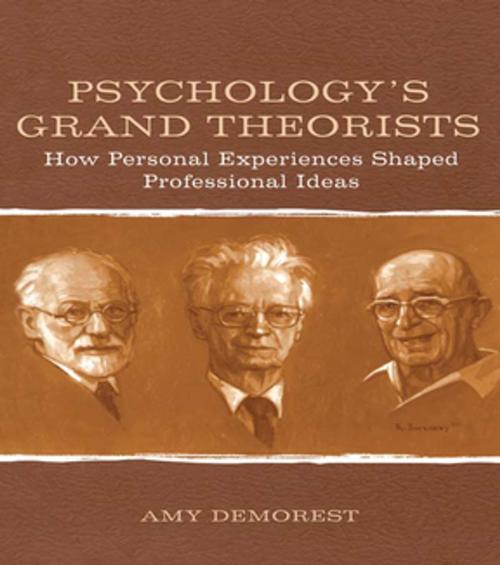Psychology's Grand Theorists
How Personal Experiences Shaped Professional Ideas
Nonfiction, Health & Well Being, Psychology, History, Personality, Biography & Memoir, Reference| Author: | Amy P. Demorest | ISBN: | 9781135609153 |
| Publisher: | Taylor and Francis | Publication: | April 8, 2014 |
| Imprint: | Psychology Press | Language: | English |
| Author: | Amy P. Demorest |
| ISBN: | 9781135609153 |
| Publisher: | Taylor and Francis |
| Publication: | April 8, 2014 |
| Imprint: | Psychology Press |
| Language: | English |
Psychology's Grand Theorists argues that the three schools in psychology that have been dominant historically--the psychodynamic, behavioral, and phenomenological--have resulted in large part from the personal experiences of their originators. Sigmund Freud, B.F. Skinner, and Carl Rogers each believed that he had discovered the truth about human nature, yet their truths are entirely different. This book explores how the lives of these men influenced the divergent theories they developed, through a close examination of letters, diaries, biographies, autobiographies, and professional writings. Uncovering the subjective sources of these theories, the book gives the reader a greater sense of intimacy with each man's ideas, and promotes critical inquiry into their scientific status. The book is written in an engaging style that will appeal to a wide range of readers. Intended as a supplement in courses on personality, clinical psychology, and/or the history of psychology, it will also be of interest to clinicians or counselors who use one or more of these theoretical models in their therapeutic work.
Psychology's Grand Theorists argues that the three schools in psychology that have been dominant historically--the psychodynamic, behavioral, and phenomenological--have resulted in large part from the personal experiences of their originators. Sigmund Freud, B.F. Skinner, and Carl Rogers each believed that he had discovered the truth about human nature, yet their truths are entirely different. This book explores how the lives of these men influenced the divergent theories they developed, through a close examination of letters, diaries, biographies, autobiographies, and professional writings. Uncovering the subjective sources of these theories, the book gives the reader a greater sense of intimacy with each man's ideas, and promotes critical inquiry into their scientific status. The book is written in an engaging style that will appeal to a wide range of readers. Intended as a supplement in courses on personality, clinical psychology, and/or the history of psychology, it will also be of interest to clinicians or counselors who use one or more of these theoretical models in their therapeutic work.















